八年级英语上册 Unit 3 A day out重难点解析 1
牛津译林版八年级上册Unit 3《A day out》(Vocabulary)说课稿

牛津译林版八年级上册Unit 3《A day out》(Vocabulary)说课稿一. 教材分析《牛津译林版八年级上册Unit 3 A day out》是人教版初中英语教材的一个组成部分,本节课主要围绕“旅游”这一主题展开,通过描述不同地方的特色,让学生学会如何表达自己的旅游经历。
教材内容丰富,插图生动,有利于激发学生的学习兴趣。
同时,本节课还涉及到一些旅游相关的词汇和表达方式,有助于学生扩展词汇量,提高口语表达能力。
二. 学情分析根据我对学生的了解,他们大多数人都喜欢旅游,对不同地方的风景和文化充满好奇。
因此,本节课的主题能够激发他们的学习兴趣。
另外,学生已经掌握了基本的英语语法和词汇,具备一定的口语表达能力。
但是,他们在使用英语描述具体事物和表达个人经历方面还存在一定的困难,这是本节课需要解决的问题。
三. 说教学目标1.知识目标:学生能够掌握本节课所学的旅游相关词汇和表达方式,如“旅游”、“特色”、“参观”等。
2.能力目标:学生能够用英语描述自己的旅游经历,提高口语表达能力。
3.情感目标:通过本节课的学习,培养学生对旅游的热爱,增长见识,拓宽视野。
四. 说教学重难点1.重点:旅游相关词汇和表达方式的掌握。
2.难点:如何用英语描述自己的旅游经历,表达具体事物和个人感受。
五. 说教学方法与手段1.交际法:通过小组讨论、角色扮演等形式,让学生在实际语境中运用所学知识。
2.任务型教学法:通过完成具体任务,如描述旅游景点、规划旅游行程等,培养学生运用英语的能力。
3.情境教学法:利用插图、多媒体等手段,为学生创设真实的旅游情境。
4.激励评价法:及时鼓励和表扬学生的进步,提高他们的学习积极性。
六. 说教学过程1.导入:以一幅美丽的旅游景点图片吸引学生的注意力,引导学生谈论自己最喜欢的旅游地点。
2.新课呈现:通过展示教材插图,引导学生学习旅游相关词汇和表达方式。
3.实践环节:学生分组讨论,用英语描述自己曾经去过的旅游景点。
8A《 Unit 3 A day out》教学设计-优质教案

4. Go through the useful expressions.
5. Read together.
设计说明:Try to let students be familiar with the information about the plan for a day out.
plete a passage about planning a day out .
4.学习重点难点
Key words and some phrases.
Learn to plan a day out and improve writing skills.
5.学习评价设计
1. To learn to make a plan for a day out..
3. Ask the students to make a plan for their trip.
4. Write an invitation letter according to their plans.
5. Invite some of the students to show their letters.
Help students to learn some useful expressions.
Step 4Writing
1. To learn different parts in the invitation letter.
2. Linda will go back to the USA. We will invite her to visit our hometown Zhenjiang.
牛津译林版英语八年级上册重点短语(Unit 3 A day out

知识梳理:【短语学习】1. enjoy oneself ☆☆【用法】enjoy oneself玩得开心 =have fun, have a good time【例句】My sister enjoyed herself on her birthday party yesterday.我妹妹昨天在她的生日宴会上玩得很开心。
The children enjoyed themselves in the park last Sunday.上周日孩子们在公园里玩得很开心。
【考点】考查短语enjoy oneself的含义和反身代词的用法。
【易错点】反身代词的拼写和用法【考题链接】The girl enjoyed _____________________________(she)last night.答案:herself思路分析:enjoy oneself玩得开心。
2. be made of ☆☆【用法】be made of由……制成【例句】This jacket is made of cotton. 这件夹克是棉花做的。
What is the door made of? 这扇门是什么做的?【考点】考查be made of, be made from, be made in的含义和用法。
【易错点】be made of与 be made from的区别。
【考题链接】The train is made _________________steel, and it is made ________________ Zhuzhou.A. of, ofB. of, inC. from, ofD. in, in答案:B思路分析:be made of由……制成,be made in+地点,在某地制造。
3. invite sb. to do sth. ☆【用法】invite sb. to do sth. 邀请某人做某事invite sb. to + a place邀请某人到某地【例句】My friend invited me to climb the hill with him last Sunday.上周日,我朋友邀请我跟他一起爬山。
2019-2020学年八年级英语上册 Unit 3 A day out重难点解析 1 牛津版

2019-2020学年八年级英语上册 Unit 3 A day out重难点解析 1 牛津版词语解析1. beginning n.beginning用作名词,意为“开始,起初”。
常见短语有:at the beginning (一开始,起初),at the beginning of ... (在……开始的时候)。
例如:A good beginning makes a good ending.善始者善终。
At the beginning of June, I went to the United States. 在六月初,我去了美国。
★此外,begin是beginning的动词形式,意为“开始”。
例如:The meeting begins at 3 o’clock in the afternoon.会议下午三点钟开始。
I began to wonder if he would ever come.我开始怀疑他会不会来。
2. interest n.interest既可作可数名词,也可作不可数名词,意为“兴趣,爱好;令人感兴趣的事(或人)”。
作为“多种兴趣”讲时,它常用复数形式。
interest常与动词have,take, feel, find, show, lose等搭配,其后常接介词in。
例如:As a boy, Edison showed a special interest inscience. 爱迪生小时候对科学特别感兴趣。
He lost in terest in such things.他对这样的事情失去了兴趣。
★此外,interest也可用作及物动词,意为“使……感兴趣;使……对……感兴趣”。
例如:Football doesn’t interest me at all.足球一点儿也提不起我的兴趣。
3. beauty n.beauty用作名词,意为“美,美丽”,是不可数名词。
beauty 也可作可数名词,意为“非常漂亮的女人;美好的事物”。
英语牛津译林八上Unit3教案全单元

b.布置一篇关于户外活动的作文,要求学生运用所学知识,提高写作能力。
c.推荐与户外活动相关的英语阅读材料,拓展学生的知识面,提高阅读理解能力。
本节课程教学技巧和窍门
一、语言语调
1.在讲解现在进行时态时,教师应注意语调的变化,以引起学生的注意。
2.在提问和回答环节,使用升调和降调,增加语言的感染力。
二、时间分配
c. Integrated skills部分:学生通过听力和口语练习,运用现在进行时态进行交流。
3.例题讲解:针对本节课的重点和难点,讲解典型例题,帮助学生巩固所学知识。
4.随堂练习:设计相关练习题,让学生在课堂上及时巩固所学知识。
5.小结:对本节课的内容进行总结,强调现在进行时态的用法。
六、板书设计
2.拓展活动:鼓励学生运用现在进行时态进行日常交流,提高口语表达能力;布置作文和推荐阅读材料。
详细说明:
1.针对性辅导:教师根据学生在课堂上的表现和作业情况,了解学生对现在进行时态的掌握情况,针对问题进行一对一或小组辅导,帮助学生克服难点。
2.拓展活动:
a.鼓励学生在日常生活中,用现在进行时态进行口语交流,提高口语表达能力。
七、作业设计
1.作业题目:
a.根据所给图片,用现在进行时态描述图片中的动作。
b.根据课文内容,完成一篇关于一次户外活动的文章。
2.答案:
八、课后反思及拓展延伸
1.反思:通过课后反思,教师了解学生对现在进行时态的掌握情况,针对学生的问题进行针对性的辅导。
2.拓展延伸:
a.鼓励学生运用现在进行时态进行日常交流,提高口语表达能力。
b.布置一篇关于户外活动的作文,让学生巩固所学知识,并提高写作能力。
牛津译林版英语八上Unit3《Adayout》(task)说课稿
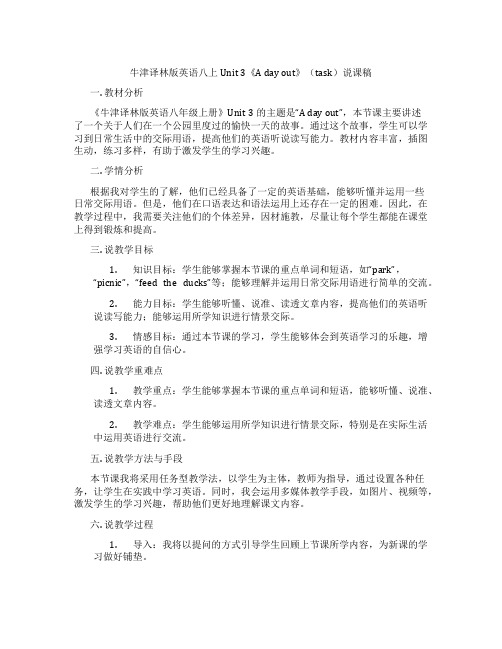
牛津译林版英语八上Unit 3《A day out》(task)说课稿一. 教材分析《牛津译林版英语八年级上册》Unit 3的主题是“A day out”,本节课主要讲述了一个关于人们在一个公园里度过的愉快一天的故事。
通过这个故事,学生可以学习到日常生活中的交际用语,提高他们的英语听说读写能力。
教材内容丰富,插图生动,练习多样,有助于激发学生的学习兴趣。
二. 学情分析根据我对学生的了解,他们已经具备了一定的英语基础,能够听懂并运用一些日常交际用语。
但是,他们在口语表达和语法运用上还存在一定的困难。
因此,在教学过程中,我需要关注他们的个体差异,因材施教,尽量让每个学生都能在课堂上得到锻炼和提高。
三. 说教学目标1.知识目标:学生能够掌握本节课的重点单词和短语,如“park”,“picnic”,“feed the ducks”等;能够理解并运用日常交际用语进行简单的交流。
2.能力目标:学生能够听懂、说准、读透文章内容,提高他们的英语听说读写能力;能够运用所学知识进行情景交际。
3.情感目标:通过本节课的学习,学生能够体会到英语学习的乐趣,增强学习英语的自信心。
四. 说教学重难点1.教学重点:学生能够掌握本节课的重点单词和短语,能够听懂、说准、读透文章内容。
2.教学难点:学生能够运用所学知识进行情景交际,特别是在实际生活中运用英语进行交流。
五. 说教学方法与手段本节课我将采用任务型教学法,以学生为主体,教师为指导,通过设置各种任务,让学生在实践中学习英语。
同时,我会运用多媒体教学手段,如图片、视频等,激发学生的学习兴趣,帮助他们更好地理解课文内容。
六. 说教学过程1.导入:我将以提问的方式引导学生回顾上节课所学内容,为新课的学习做好铺垫。
2.呈现:我会通过展示图片、播放视频等方式,引入本节课的主题,让学生整体感知课文内容。
3.精讲:我会在学生初步理解课文的基础上,讲解重点单词和短语,并通过例句、练习等方式,让学生充分理解和掌握。
译林八年级上Unit3Adayout知识点总结

译林八年级上Unit3Adayout知识点总结译林8A Unit 3 A day out知识点总结1、climb a hill 爬山2、need做实义动词,表示需要,后可跟不定式、名词或代词做宾语,表示主动含义need to do sth 需要做某事当物做主语,need后接动名词做宾语,表示被动含义,相当于need to be doneThis car needs repairing. 这辆车需要(被)修理need做情态动词,没有人称、时态和数的变化,后接动词原形,常用于疑问句和否定句中You needn’t worry about it. 不用担心3、keep fit 保持身体健康You need to exercise and keep fit.4、come on 来吧,快点儿,表示催促Come on!The bus is leaving. 快点儿,公车就要开走了。
come on 还可以表示挑战、命令、恳求、激励别人、给别人助威等Come on,and see with your own eyes!跟我来,你自己亲眼看看吧Come on,you can do it!没问题,你能行!Come on!Come on!加油!加油!5、find out 搞清楚,弄明白6、enjoy oneself/oneselves=have a good/nice/wonderful time=have fun 玩得愉快7、make a plan for a day trip(for sb). 为某人制定出游一天的计划8、write to sb 给某人写信9、an invitation letter 一封邀请信10、take a boat trip 乘船旅行11、go past走过,路过12、the Sydney Opera House 悉尼歌剧院13、Take care!保重take care = look out = be careful小心,当心take care of = look after 照顾,照看14、by the River Seine 在塞纳河边(介词by)15、at the top of 在….的顶部on top of…在…上面,在…上方16、See you soon. 回见17、How long/wide/tall/high is …. ….多长/宽/高/高?widely 广泛地,普遍地18、成品+be made of +材料由…制成,能看出原材料成品+be made from +原料由…制成,看不出原材料成品+be made in+产地…制造,产自…Desks are made of wood. 书桌是用木头做的Paper can be made from grass. 纸可以用草来制造Trains are made in Zhuzhou. 火车是在株洲生产的19、around the world = all over the world 全世界travel around the world 周游世界20、invite sb to do sth 邀请某人做某事21、join 参加党派、组织、群体,成为一员join the Party 入党join in 参加竞赛、娱乐、游戏等,和其他人一起参加join in the game 参与游戏take part in 参加者积极参与活动并在活动中发挥作用take part in the meeting 参加会议22、a fine warm day 晴朗温暖的一天23、The sun is shining. 阳光明媚shine->shone ->shone 过去式,过去分词shiny adj. 光亮的,闪闪发光的24、in a clear blue sky 在湛蓝的天空25、be (too/quite)far away (很)遥远be far away from…离……遥远far 可以用具体的距离值代替My home is 2 kilometers away from the school.My home is far away from the school.26、It took us about two hours to get there by bus.=We spent two hours (in) getting there by bus.27、arrive in +大地点arrive in Beijing到达北京arrive at +小地点arrive at the garden 到公园get to 口语到达以上三种表达,当后面接home,there,here等副词时,不需要加介词,arrive home,get homereach 及物动词,直接加宾语,一般后面不接地点副词28、a lot of traffic 车辆很多29、on the way 在路上on my way home 在我回家的路上by the way 顺便问一下in a way 在某种程度上in the way 挡道30、finally = in the end = at last 最后,最终31、can’t wait to do sth /can’t wait for sth 迫不及待做某事32、get off 下车get on 上车get in the car/taxi 上小汽车/出租车get out of car/taxi 下小汽车/出租车33、the whole world 全世界34、in front of …在……前面in the front of 在……前面(内部的前面)There is a blackboard in the front of our classroom.35、place(s) of interest =sight(s) 景点36、believe one’s eyes 相信某人的眼睛I can’t believe my eyes. 我不敢相信自己的眼睛37、the song and dance shows 歌舞表演38、home page 主页web page 网页39、for oneself 亲自by oneself = alone =on one’s own 独自,独立地40、人或物在某些方面相同as adj/adv asA not as/so adj/adv asB A不如B……Jack is as tall as Tom. Jack和Tom一样高Jack runs as fast/quickly as Tom. Jack和Tom跑得一样快Jack doesn’t run as/so fast/quickly as Tom.Tom runs faster than Jack.Jack runs slower than Tom.41、主语和宾语是同一个人或物时,用反身代词1)做宾语,常接在以下词后面buy /hurt/enjoy/help/teach/wash/look afterteach oneself = learn sth by oneself 自学2)同位语The novel itself is boring.3)做表语The man in the story is himself.42、try (not)to do sth 尽力(不)做某事43、pull up 往高处攀登,拔起来,费力地站起来Don’t pull up the young tree.Simon is trying to pull himself up the rocks.44、luckily 幸运地unluckily 不幸地位于句首,做状语Luckily,some climbers helped Simon.Unluckily,Tom didn’t catch the bus.45、keep the secret to oneself 保守秘密46、final n.决赛;adj最后的get to the final 进入决赛in the final47、take place 发生,举行,不及物动词短语,无被动语态happen 发生,有偶然性,不是计划好的48、cheer for 为……欢呼,为……喝彩49、forget to do sth 忘了要做某事forget doing sth 做过某事,但忘了50、with one’s support 在某人的支持下without one’s support 没有某人的支持With your support ,we will win.I can’t do that without your support.51、half-time 中场休息Half-time is a 20-minute period for the players to rest.have/take a rest 休息一下52、a visiting friend 一位来访的朋友53、the Summer Palace 夏宫,颐和园the Great Wall 长城the China Science and Technology Meseum 中国科学技术博物馆54、free 免费的;空闲的,自由的55、think、believe、expect后接否定句时,否定前移到主句里I don’t think he is right. 我认为他是错的56、by+交通工具by underground 乘地铁take the +交通工具乘坐…take the undergroundride a bike drive a car。
牛津译林版八年级英语上册:Unit3 A day out(含答案)
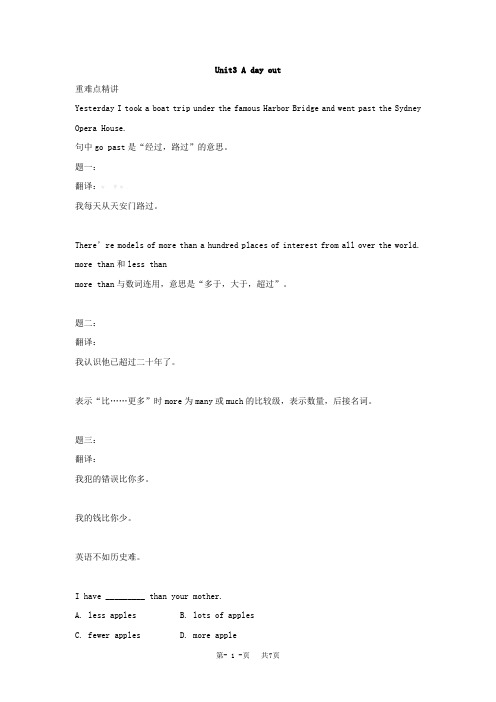
Unit3 A day out重难点精讲Yesterday I took a boat trip under the famous Harbor Bridge and went past the Sydney Opera House.句中go past是“经过,路过”的意思。
题一:翻译:w W w .我每天从天安门路过。
There’re models of more than a hundred places of interest from all over the world. more than和less thanmore than与数词连用,意思是“多于,大于,超过”。
题二:翻译:我认识他已超过二十年了。
表示“比……更多”时more为many或much的比较级,表示数量,后接名词。
题三:翻译:我犯的错误比你多。
我的钱比你少。
英语不如历史难。
I have _________ than your mother.A. less applesB. lots of applesC. fewer applesD. more appleThe match takes place on...in Moonlight town.句中take place的意思是“举行,发生”,一般指非偶然性事件的“发生”,即这种事件的发生一定有某种原因或事先的安排。
happen作“发生、碰巧”解,一般用于偶然或突发性事件。
题四:翻译:运动会会在下个礼拜举行。
你怎么了?Come and cheer for our team.句中的and是什么意思?句中的cheer是“加油,喝彩”的意思。
题五:翻译:来看看吧。
大家看见我时都大声欢呼。
她让我振作起来。
cheers是干杯和祝福语,有“合作愉快”的意思。
It’s free for groups of 30 or more students.free有“免费的,空闲的,自由”的意思。
牛津译林版八年级英语上册Unit3Adayout单元知识点汇总词汇语法句型综合讲义

牛津译林版八年级英语上册Unit3Adayout单元知识点汇总词汇语法句型综合讲义牛津译林版八年级英语上册Unit 3 A day out单元知识点汇总Vocabulary1.enjoy oneself 玩的高兴[同义词:have a good time/have fun]-I am going to Beijing on vacation .-Enjoy yourself.2.Australia n.澳大利亚Australian n.澳大利亚人;adj.澳大利亚(人)的I am an Australian boy.3.president n.总统;总裁chairman/chairperson n.主席Being a president may be a little tired.4.辨析arrive/get to/reacharrive vi. 到达(不及物动词,加at/in/on再接地点);还可以指引申含义,“到来”get to: 到达(直接加地点)reach:vt 到达(直接加地点)She arrived in Beijing two hours ago.=She got to Beijing two hours ago.She reached Beijing two hours ago,When spring arrives,we usually take off thick clothes.5.finally adv.最后[同义词]:in the end/finally/at last/eventually6.can’t wait to do sth 迫不及待做某事Receiving the box,I couldn’t wait to open the box.7.get on 上车(大型的交通工具,尤其指bus,反义词get off) get in 上车(小型的交通工具,尤其指car,反义词get out of)8.take an interest in...对......感兴趣place of interest 名胜古迹9.main adj. 主要的What’s the main idea of the passage?10.culture n.文化cultural adj.文化的11.home page 主页12.luckily adv.幸运地Luckily,I passed the exam.13.support v.支持n.支持My father supports a big family.14.辨析take place和happentake place 发生;举行(不及物动词词组;按照计划举行)happen vi: 发生(不及物动词;出乎意料地发生,多指自然灾害)A sports meeting will take place next week.Great changes have taken place in our hometown over the years.An earthquake happened in Japan a few days ago.14.cheer vt.欢呼n.欢呼声;喝彩[cheers 干杯;再见;谢谢] cheer sb up 使......欢呼正跃cheer on 为......加油Cheers of encouragement are going on in the cinema.We all cheered the star.15.free adj.免费的;空闲的;自由的free of charge 不收钱for free 免费in one’s free time 在某人空闲的时间15.hope n.希望in the hope of...抱着......的希望in the hope that...怀着......的希望I am going to Suzhou in the hope of having a look at the Gardens.I am going to Suzhou in the hope that I can have a look at the Gardens.16.meaning n.意义meaningful adj.有意义的meaningless adj.无意义的mean v.意味着;意思是be of great meaning 很有意义=very meaningfulWhat’s the meaning of the gesture?=What does the gesture mean?17.taste n.味道,品味v .品尝linking verb. 尝起来I don’t like the taste of carrots.I can’t wait to taste the dishes.The noodles taste delicious.18.take care 保重;当心take care to do sth 当心做某事take care not to do sth 当心不要做某事take care that从句(从句多用一般现在时)当心...... Take care to spell every word right.Take care not to hurt your finger.19.fine adv.够好adj.身体好;天气好I am doing fine now.I am fine.It is a fine day.20.wide adj.宽的width n.宽度widen v.加宽The desk is about one meter wide.21.Internet n.网络on the Internet=on line=online 在网上surf the internet 网上冲浪22.rest n.休息;剩余vi:休息have a rest/ break 休息一会the rest of... 剩下所有的......I am tired,so I need to rest for a while.I am taller than the rest of the students in my class.23.final n.决赛[扩展] match 比赛(大型的比赛,通常指运动项目)competition n.竞赛(比赛的胜负通常一眼就能看出来)contest n.竞赛(由评委和裁判决定冠军的比赛)24.cost n.费用,成本[扩展] price n.价格value n.价值25.ticket n.票the ticket for the concert/fashion show 音乐会/时尚演出的门票the ticket to Shanghai 去北京的票[扩展] 以下的搭配中也有to 表示后置定语the answer to the question 问题的答案the solution to the problem 问题的解决措施the key to the door 门的钥匙(key表示‘答案,关键’等含义时,也用此搭配)the flight to Beijing 去北京的航班Grammar Focus反身代词I myselfyou yourself/yourselveswe ourselveshe himselfshe herselfit itselfthey themselves反身代词在句中通常做表语,宾语和同位语。
牛津译林版英语八年级上册《Unit3AdayoutWelcometotheunit》说课稿1

牛津译林版英语八年级上册《Unit 3 A day out Welcome to the unit》说课稿1一. 教材分析《Unit 3 A day out Welcome to the unit》是牛津译林版英语八年级上册的一单元。
本单元主要围绕着“一天的郊游”这个主题展开,通过介绍不同地点的风景和活动,让学生学会描述和规划一次郊游活动。
教材内容丰富,插图生动,激发学生的学习兴趣,同时也培养了他们的观察力和想象力。
二. 学情分析根据我对学生的了解,他们已经掌握了基本的英语语法和词汇,具备一定的听说读写能力。
但是在实际运用中,部分学生还存在一定的困难,如口语表达能力较弱,写作能力有待提高等。
此外,学生的学习兴趣和学习动机也是影响教学效果的重要因素。
三. 说教学目标1.知识目标:学生能够掌握本单元的重点词汇和句型,如“go for awalk”、“visit a museum”等,并能够运用它们描述一次郊游活动。
2.能力目标:学生能够听懂、会说本单元的主题句子,提高口语表达能力;同时,能够运用所学的词汇和句型进行写作,提高写作能力。
3.情感目标:通过本单元的学习,学生能够培养对自然风光和户外活动的热爱,提高生活品质。
四. 说教学重难点1.重点:本单元的重点是让学生掌握描述一次郊游活动的词汇和句型,提高他们的口语表达和写作能力。
2.难点:学生需要能够在实际情境中正确运用所学的词汇和句型,进行流畅的口语表达和写作。
五. 说教学方法与手段1.教学方法:采用任务型教学法,让学生在完成实际任务的过程中,运用所学知识,提高语言能力。
2.教学手段:利用多媒体课件、图片等教学资源,创设情境,激发学生的学习兴趣。
六. 说教学过程1.导入:通过展示一幅美丽的自然风光图片,引导学生谈论他们对户外活动的看法,激发学生的学习兴趣。
2.新课呈现:教师通过展示不同地点的风景和活动图片,引入本课的主题,同时教授相关词汇和句型。
3.任务型活动:学生分组讨论,规划一次郊游活动,并运用所学的词汇和句型进行描述。
八年级英语上册_Unit_3_A_day_out重点词组整理
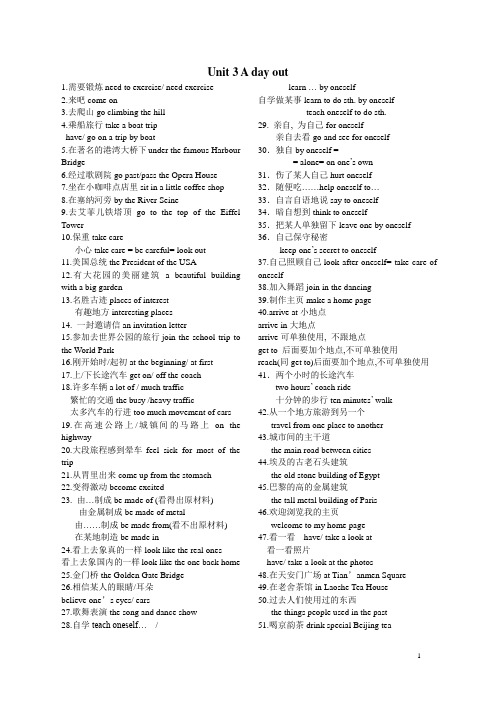
Unit 3 A day out1.需要锻炼need to exercise/ need exercise2.来吧come on3.去爬山go climbing the hill4.乘船旅行take a boat triphave/ go on a trip by boat5.在著名的港湾大桥下under the famous Harbour Bridge6.经过歌剧院go past/pass the Opera House7.坐在小咖啡点店里sit in a little coffee shop8.在塞纳河旁by the River Seine9.去艾菲儿铁塔顶go to the top of the Eiffel Tower10.保重take care小心take care = be careful= look out11.美国总统the President of the USA12.有大花园的美丽建筑 a beautiful building with a big garden13.名胜古迹places of interest有趣地方interesting places14. 一封邀请信an invitation letter15.参加去世界公园的旅行join the school trip to the World Park16.刚开始时/起初at the beginning/ at first17.上/下长途汽车get on/ off the coach18.许多车辆a lot of / much traffic繁忙的交通the busy /heavy traffic太多汽车的行进too much movement of cars 19.在高速公路上/城镇间的马路上on the highway20.大段旅程感到晕车feel sick for most of the trip21.从胃里出来come up from the stomach22.变得激动become excited23. 由…制成be made of (看得出原材料)由金属制成be made of metal由……制成be made from(看不出原材料)在某地制造be made in24.看上去象真的一样look like the real ones看上去象国内的一样look like the one back home25.金门桥the Golden Gate Bridge26.相信某人的眼睛/耳朵believe one’s eyes/ ears27.歌舞表演the song and dance show28.自学teach oneself… /learn … by oneself自学做某事learn to do sth. by oneselfteach oneself to do sth.29. 亲自, 为自己for oneself亲自去看go and see for oneself30.独自by oneself == alone= on one’s own31.伤了某人自己hurt oneself32.随便吃……help oneself to…33.自言自语地说say to oneself34.暗自想到think to oneself35.把某人单独留下leave one by oneself 36.自己保守秘密keep one’s secret to oneself37.自己照顾自己look after oneself= take care of oneself38.加入舞蹈join in the dancing39.制作主页make a home page40.arrive at小地点arrive in大地点arrive可单独使用, 不跟地点get to 后面要加个地点,不可单独使用reach(同get to)后面要加个地点,不可单独使用41.两个小时的长途汽车two hours’ coach ride十分钟的步行ten minutes’ walk42.从一个地方旅游到另一个travel from one place to another43.城市间的主干道the main road between cities44.埃及的古老石头建筑the old stone building of Egypt45.巴黎的高的金属建筑the tall metal building of Paris46.欢迎浏览我的主页welcome to my home page47.看一看---have/ take a look at看一看照片have/ take a look at the photos48.在天安门广场at Tian’anmen Square49.在老舍茶馆in Laoshe Tea House50.过去人们使用过的东西the things people used in the past51.喝京韵茶drink special Beijing tea52.欣赏精彩的京剧enjoy wonderful Beijing opera53.看令人惊奇的景色look at the amazing view54.漫步湖周围walk slowly around the lake55. ……的美the beauty of感受古老公园的美丽feel the beauty of the old park56. 远be far away离---远be far away from ---57.乘地铁去颐和园旅行travel by underground to the Summer Palace58.乘出租车到北京市中心周围take a taxi around the centre of the Beijing59.环游世界travel around the world60.去骑马go horse riding61.决定做/不做某事decide to do/ not to do sth.62.同意做某事agree to do sth.63.选择做某事choose to do sth.64.为---作准备prepare for sth.为期中考试作准备prepare for the mid- term test准备做某事prepare to do sth.准备写一篇文章prepare to write an article 65. 记住去做某事remember to do sth.记得做过某事remember doing sth.66. 忘记去做某事forget to do sth.忘记做过某事forget doing sth.67. 停止正在做的某事stop doing sth.停下来去做另一件事stop to do sth.68. 尽力去做某事try to do sth.尝试着做某事try doing sth.69. 使某人(不)做某事make sb.(not)do sth.70. 让某人(不)做某事let sb.(not)do sth.71. 看见/听见某人正在做某事see/ hear sb. doing sth.看见/听见某人做某事(全过程)see / hear sb. do sth.72. 告诉/要求某人(不要)去做某事tell/ ask sb. (not) to do sth.73. 希望做某事hope to do sth.希望观看日出hope to watch the sunset 74. 计划做某事plan to do sth.Make a plan to do sth.75.坐在公共车的前面sit in the front of the bus76.玩捉迷藏play hide-and-seek77.爬岩石climb the rocks攀爬岩石pull oneself up on the rocks去爬岩石go climbing on rocks78.对某人保密keep the secret to sb.对他们自己保守秘密keep their secret to themselves为某人保密keep the secret for sb.为他们保守秘密keep the secret for them79.需要你们的支持need your support有你们的支持with your support= with the support of yours没有你的支持without your support80.进入决赛go to the final81.在篮球比赛的决赛中in the final of the basketball competition82. 发生,举行take place83. 为某人喝彩cheer for sb.为我们对喝彩cheer for our team84.公交车费bus fare85.每个人per person86.就座go to one’s seat87.颁奖仪式the presentation of the cup and medals88.行程的费用the cost of the trip89.接受奖杯和奖牌receive the cup and medals90.在决赛结束时at the end of the final91.回到学校get back to school/return to school回到家go back home= return home92.多好的主意! What a great idea!93.面积---平方米… square metres in area面积10 平方米10 square metres in area94. 一个参观的有趣的地方a fun place to visit95.参观人民大会堂visit the People’s Great Hall96.看最大的城市广场see the biggest city square97.换乘公交车change to the bus98.一路乘公共车到—take the bus all the way to ----99.尽快as soon as possible /as soon as sb. can100.在下半场in the second half101打得糟play badly102.去机场go to the airport103.打包pack one’s bag104.计算出work out计算出旅行的费用work out the cost of the trip把它/他们计算出来work it/ them out105. learn a lot about different cultures对不同文化了解很多106.the main sight of the world 世界上的主要景点107.China Science and Technology Museum 中国科技博物馆108.It‘s free for groups of 30 or more students. 30或30以上的团体是免费的。
牛津译林版八年级英语上册教案Unit3Reading

牛津译林版八年级英语上册教案Unit3Reading一、教学内容本节课选自牛津译林版八年级英语上册Unit3 Reading部分,主要讲解章节为“A day out”,内容详细描述了一家人在公园度过一天的场景,包括描述了公园的自然景观、活动项目以及家庭之间的亲情互动。
二、教学目标1. 能够理解并运用文本中的重点词汇和句型进行日常交流。
2. 能够掌握一般过去时的用法,并运用到实际情境中。
3. 能够理解文本内容,把握文章主旨,提高阅读能力。
三、教学难点与重点1. 教学重点:掌握一般过去时,运用重点词汇和句型进行交流。
2. 教学难点:理解并运用一般过去时描述过去发生的事情。
四、教具与学具准备1. 教具:PPT、黑板、录音机、磁带。
2. 学具:课本、练习本、字典。
五、教学过程1. 导入:通过展示一组公园游玩的照片,引发学生对主题的思考,激发学习兴趣。
2. 阅读前:引导学生预测文章内容,进行头脑风暴,激活背景知识。
3. 阅读中:让学生快速阅读文本,了解文章大意;接着详细阅读,理解文章细节;通过问题链的形式,检查学生对文本的理解。
4. 阅读后:进行小组活动,让学生运用一般过去时,描述自己的一次公园游玩经历。
5. 例题讲解:针对一般过去时进行讲解,并通过例题让学生进行实际操作。
6. 随堂练习:设计练习题,让学生巩固所学知识。
六、板书设计1. Unit3 Reading A day out2. 重点词汇:hill、boating、visit、picnic、enjoy等。
3. 重点句型:We visited the park last weekend. We had a picnic on the hill.4. 一般过去时的构成:主语 + 动词过去式 + 其他。
七、作业设计1. 作业题目:(1)根据课文内容,完成填空题。
(2)运用一般过去时,写一篇关于自己一次公园游玩的短文。
答案:(1)略。
Last weekend, I went to the park with my family. Wevisited the hill and had a picnic there. We also went boating on the lake and enjoyed the beautiful scenery. It was a wonderful day out!八、课后反思及拓展延伸1. 反思:本节课通过实践情景引入、例题讲解和随堂练习,让学生掌握了重点知识。
牛津译林版八年级上册英语 Unit 3:A day out单元重点词组和表达整理(word版)
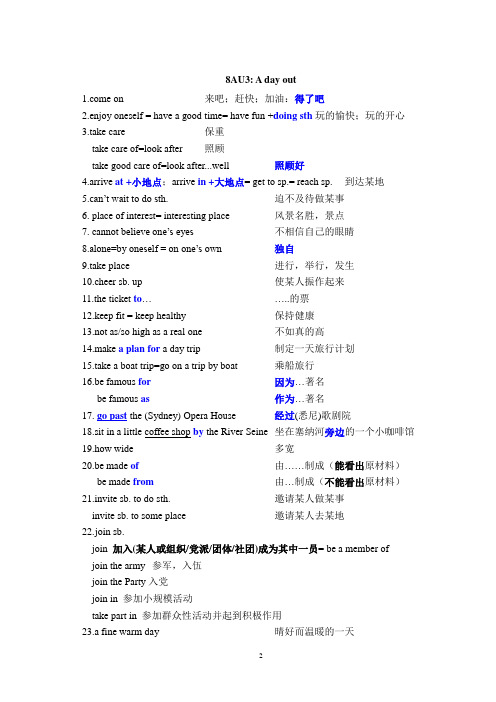
8AU3: A day oute on 来吧;赶快;加油:得了吧2.enjoy oneself = have a good time= have fun +doing sth玩的愉快;玩的开心3.take care 保重take care of=look after 照顾take good care of=look after...well 照顾好4.arrive at +小地点;arrive in +大地点= get to sp.= reach sp. 到达某地5.can’t wait to do sth.迫不及待做某事6. place of interest= interesting place 风景名胜,景点7. can not believe one’s eyes不相信自己的眼睛8.alone=by oneself = on one’s own独自9.take place 进行,举行,发生10.cheer sb. up 使某人振作起来11.the ticket to… …..的票12.keep fit = keep healthy 保持健康13.not as/so high as a real one 不如真的高14.make a plan for a day trip 制定一天旅行计划15.take a boat trip=go on a trip by boat 乘船旅行16.be famous for因为…著名be famous as作为…著名17. go past the (Sydney) Opera House 经过(悉尼)歌剧院18.sit in a little coffee shop by the River Seine 坐在塞纳河旁边的一个小咖啡馆19.how wide 多宽20.be made of由……制成(能看出原材料)be made from由…制成(不能看出原材料)21.invite sb. to do sth. 邀请某人做某事invite sb. to some place 邀请某人去某地22.j oin sb.join 加入(某人或组织/党派/团体/社团)成为其中一员= be a member ofjoin the army 参军,入伍join the Party入党join in 参加小规模活动take part in 参加群众性活动并起到积极作用23.a fine warm day 晴好而温暖的一天24.shine in a clear blue sky 在晴朗的蓝天下照耀25.a lot of /much/heavy traffic(不可数)交通拥挤26.a little boring 有一点儿无聊a little=a bit=a little bit+adjA little=a bit of+不可数名词27.get on/ off 上/下车get on the bus/ get on it (代词放后面)28.the whole world=all over the world 整个世界29.look as great as the one back home 看上去和家乡的一样好30.the main sights of the world 世界上主要的景点31.learn a lot about different cultures了解许多不同的文化32.go and see for yourself去亲自看看33.finally = at last = in the end(1,2,3)最后34.in some ways 在某些方面/在某种程度上35.try to do sth. 尽力做某事36.pull himself up the rocks 攀岩37.keep the secret to oneself 保守秘密在心里38.get to the final进入决赛39.the Students’ Union学生会40.forget to do sth 忘记去做某事(未做)forget doing sth. 忘记做过某事(做过)41.remember to do sth. 记得要做某事(未做)remember doing sth. 记得做过某事(做过)42.with your support 有了你的支持without your support 没有你的支持43.with your help=with the help of you 在你的帮助下44.the cost of the trip 旅行的费用/成本45.a 20-minute period 20分钟的时间46.during half-time 在中场休息期间47.go back to our school= return to our school 回学校48.the day before yesterday 前天49.the day after tomorrow 后天50.feel excited and cheerful 感到兴奋和高兴。
牛津译林版八年级上册英语Unit 3 A day out单词讲解和练习(含答案)
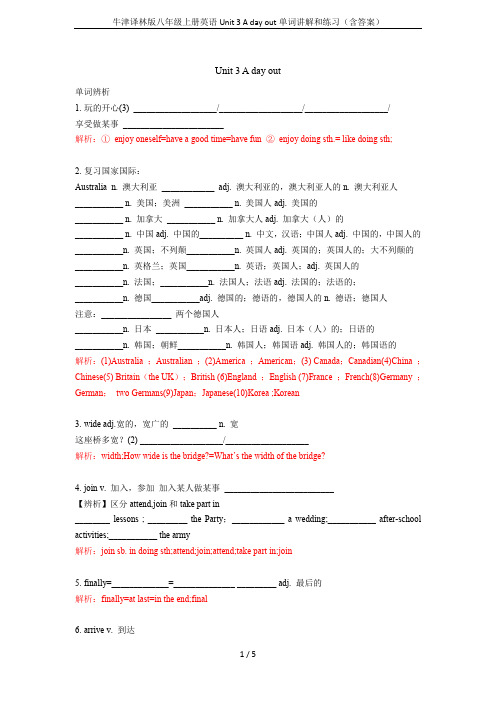
Unit 3 A day out单词辨析1.玩的开心(3) ___________________/___________________/___________________/享受做某事_______________________解析:①enjoy oneself=have a good time=have fun ②enjoy doing sth.= like doing sth;2.复习国家国际:Australia n. 澳大利亚____________ adj. 澳大利亚的,澳大利亚人的n. 澳大利亚人___________ n. 美国;美洲___________ n. 美国人adj. 美国的___________ n. 加拿大___________ n. 加拿大人adj. 加拿大(人)的___________ n. 中国adj. 中国的__________ n. 中文,汉语;中国人adj. 中国的,中国人的___________n. 英国;不列颠___________n. 英国人adj. 英国的;英国人的;大不列颠的___________n. 英格兰;英国___________n. 英语;英国人;adj. 英国人的___________n. 法国;___________n. 法国人;法语adj. 法国的;法语的;___________n. 德国___________adj. 德国的;德语的,德国人的n. 德语;德国人注意:________________ 两个德国人___________n. 日本___________n. 日本人;日语adj. 日本(人)的;日语的___________n. 韩国;朝鲜___________n. 韩国人;韩国语adj. 韩国人的;韩国语的解析:(1)Australia ;Australian ;(2)America ;American;(3) Canada;Canadian(4)China ;Chinese(5) Britain(the UK);British (6)England ;English (7)France ;French(8)Germany ;German;two Germans(9)Japan;Japanese(10)Korea ;Korean3.wide adj.宽的,宽广的__________ n. 宽这座桥多宽?(2) ___________________/___________________解析:width;How wide is the bridge?=What’s the width of the bridge?4.join v. 加入,参加加入某人做某事_________________________【辨析】区分attend,join和take part in________ lessons ; _________ the Party;____________ a wedding;___________ after-school activities;___________ the army解析:join sb. in doing sth;attend;join;attend;take part in;join5.finally=_____________=______________ _________ adj. 最后的解析:finally=at last=in the end;final6.arrive v. 到达【辨析】区分arrive,reach和get to解析:arrive in+大地方; arrive at+小地方;get to+到达的地方; reach+到达的地方。
牛津译林版 八年级英语上册 Unit 3 A day out. 重难点归纳及习题(无答案)
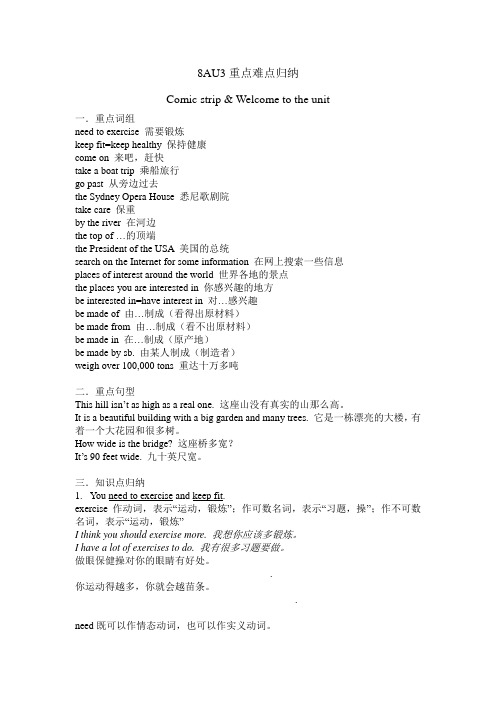
8AU3重点难点归纳Comic strip & Welcome to the unit一.重点词组need to exercise 需要锻炼keep fit=keep healthy 保持健康come on 来吧,赶快take a boat trip 乘船旅行go past 从旁边过去the Sydney Opera House 悉尼歌剧院take care 保重by the river 在河边the top of …的顶端the President of the USA 美国的总统search on the Internet for some information 在网上搜索一些信息places of interest around the world 世界各地的景点the places you are interested in 你感兴趣的地方be interested in=have interest in 对…感兴趣be made of 由…制成(看得出原材料)be made from 由…制成(看不出原材料)be made in 在…制成(原产地)be made by sb. 由某人制成(制造者)weigh over 100,000 tons 重达十万多吨二.重点句型This hill isn’t as high as a real one. 这座山没有真实的山那么高。
It is a beautiful building with a big garden and many trees. 它是一栋漂亮的大楼,有着一个大花园和很多树。
How wide is the bridge? 这座桥多宽?It’s 90 feet wide. 九十英尺宽。
三.知识点归纳1.You need to exercise and keep fit.exercise作动词,表示“运动,锻炼”;作可数名词,表示“习题,操”;作不可数名词,表示“运动,锻炼”I think you should exercise more. 我想你应该多锻炼。
Unit 3 单元话题满分范文必背-八年级英语上册单元重难点易错题精练

Unit 3 A day out单元话题满分范文必背1.假设你是Alan,今年暑假你和爸爸妈妈一起去了杭州旅游。
请你根据下面的提示和要求,给你的美国笔友Dannie写一封电子邮件,介绍你这次旅游的经历。
提示:1.暑假和父母坐飞机去杭州旅游;2.以前没见过如此美丽的城市;3.杭州以西湖著名,有很多风景名胜;4.游园、划船、爬山、购物,玩得很开心。
要求:语句连贯,词数100左右。
邮件的开头与结尾已给出,不计入总词数。
Dear Dannie,I’m glad to tell you my trip to Hangzhou this summer holiday.___________________________________________________________________________________________ ___________________________________________________________________________________________ ___________________________________________________________________________________________ ___________________________________________________________________________________________ ___________________________________________________________________________________________ How did you spend your summer holiday? Please write to me soon.Yours,Alan 【答案】例文Dear Dannie,I’m glad to tell you my trip to Hangzhou this summer holiday.I went to Hangzhou with my parents this summer vacation, which gave me a lot of fun. We went by plane. When we got there, we were attracted by the beautiful scenery of Hangzhou. People believe that Hangzhou is one of the most beautiful cities in China. So it is. I have never seen such a beautiful city before. Hangzhou is famous for the West Lake. We visited the beautiful West Lake and boated in the lake. What impressed me most was that we climbed the mountain successfully. Hangzhou’s silk is famous all over the world. Mother bought many beautiful silk clothes. We had a great time.How did you spend your summer holiday? Please write to me soon.Yours,【解析】【详解】1.题干解读:本文是一封电子邮件。
- 1、下载文档前请自行甄别文档内容的完整性,平台不提供额外的编辑、内容补充、找答案等附加服务。
- 2、"仅部分预览"的文档,不可在线预览部分如存在完整性等问题,可反馈申请退款(可完整预览的文档不适用该条件!)。
- 3、如文档侵犯您的权益,请联系客服反馈,我们会尽快为您处理(人工客服工作时间:9:00-18:30)。
Unit 3 A day out重难点解析 1
词语解析
1. beginning n.
beginning用作名词,意为“开始,起初”。
常见短语有:at the beginning (一开始,起初),at the beginning of ... (在……开始的时候)。
例如:
A good beginning makes a good ending.
善始者善终。
At the beginning of June, I went to the United States. 在六月初,我去了美国。
★此外,begin是beginning的动词形式,意为“开始”。
例如:
The meeting begins at 3 o’clock in the afternoon.
会议下午三点钟开始。
I began to wonder if he would ever come.
我开始怀疑他会不会来。
2. interest n.
interest既可作可数名词,也可作不可数名词,意为“兴趣,爱好;令人感兴趣的事(或人)”。
作为“多种兴趣”讲时,它常用复数形式。
interest常与动词have,take, feel, find, show, lose等搭配,其后常接介词in。
例如:
As a boy, Edison showed a special interest in
science. 爱迪生小时候对科学特别感兴趣。
He lost in terest in such things.
他对这样的事情失去了兴趣。
★此外,interest也可用作及物动词,意为“使……感兴趣;使……对……感兴趣”。
例如:Football doesn’t interest me at all.
足球一点儿也提不起我的兴趣。
3. beauty n.
beauty用作名词,意为“美,美丽”,是不可数名词。
beauty 也可作可数名词,意为“非常漂亮的女人;美好的事物”。
例如:
When we saw the mountain, we were moved by the beauty of nature.
当我们看到这座大山时,我们被大自然的美打动了。
She was a great beauty in her youth.
她年轻的时候是个大美人。
★此外,beautiful是beauty的形容词形式,意为“漂亮的,美丽的”。
例如:
We are now living in a beautiful new house in the country.
我们现在住在农村的一座漂亮的新房子里。
难句解析
1. You need to exercise and keep fit.
1)该句中的need是实义动词,意为“需要”,后接动词不定式,随人称和时态的变化而变化。
need也可用作情态动词,后须接动词原形,没有人称和数的变化。
例如:
She needs to say sorry to me.
她需要向我道歉。
She needn’t say sorry to me.
她不必向我道歉。
2)该句中的keep fit意为“保持健康”。
其中,keep意为“保持(某种状态)”,后通常可
接形容词,fit在此处用作形容词,意为“健康的”。
例如:
Please keep quiet! 请保持安静!
2. Kitty and I did not feel sick any more.
该句中的not ... any more是一个常见的结构,意为“不再……”,一般修饰终止性动词,表示动作不再延续。
其中,not用在系动词、助动词或情态动词之后,而any more位于句末。
not ... any more通常可与not ... any longer互换。
例如:
The worker doesn’t like the job any more.
=The worker doesn’t like the job any longer.
这个工人不再喜欢这份工作了。
3. The trip from Kitty’s school to the World Park took about two hours by coach. 该句中的take意为“花费”,常用来指花费时间,主语通常是表示事物的名词(短语)、v-ing
形式或动词不定式,但更常见的句型为:It takes (sb.) some time to do sth. 其中,it
作形式主语,不定式短语是真正的主语。
例如:
Repairing the bike took him one hour.
修自行车用了他一个小时的时间。
I t took him half an hour to work out t he Maths problem.
他花了半小时才做出了那道数学题。
★此外,句型It takes (sb.) some time to do sth. 可与Unit 2中学过的sb. spend(s) some time (in) doing sth. 互换。
例如:
It took me twenty min utes to get to school on foot. =I spent twenty minutes (in) getting to sc hool on foot.
步行去学校花了我二十分钟。
难点问答
[问]However, Kitty and I felt sick for most of the trip. 我们知道sick和ill意思相近,有时可以互换使用,那么,这个句子中的sick可以用ill来替换吗?
[答]不可以。
sick和ill虽然意思相近,但是只在表示“生病的”这一含义并作表语时,可以互换。
除此外,sick可表示“恶心的,反胃的”的意思,ill则不可。
而且需要我们注意的是,在英国英语中,sick多表示“恶心的,反胃的”的意思。
上面句子中的sick就是此意,所以不能用ill替换。
例如:
He didn’t come to school this morning because he was ill / sick.
他今天早上没来上学是因为他病了。
If you eat too many sweets you may be sick.
如果你吃太多的糖果,你可能会感到恶心。
★此外,两者作定语时,ill意为“不好的,坏的”,sick意为“生病的”,意思也不一样,使用时要注意区分。
[问]我每天坐火车去上班。
①I take train to go to work every day.
②I go to work by a train every day.
请问,这两个句子哪个是上面汉语句子的正确翻译?
[答]两个句子都不正确。
句①中,train前应该使用冠词a或the却没有用;句②中,train 前不应该使用冠词a却用了。
“介词by + 表示交通工具的名词”是固定结构,表示交通方式,在二者之间不能加任何冠词,如by car, by bike, by train, by boat等;“take + a(n) / the + 表示交通工具的名词”也是一个常见结构,表示交通方式,如take a car, take a train, take a boat等。
这两个结构常互相转换。
例如:
We often take a / the bus to go to the zoo at weekends.
=We often go to the zoo by bus at weekends.
周末,我们经常坐公共汽车去动物园。
★此外,o n foot是一个特例,表示“步行”,不用by foot。
词汇辨析
true& real
二者都可用作形容词,都有“真的”的意思,它们的区别如下:
1)real意为“真的,天然的;真实的”,指的是事实上存在,而并非是想象和虚拟的事物,与“虚”相对,其反意词为unreal。
例如:
I’m learn ing to skate on real ice.
我正在真正的冰上学习滑冰。
Are those real flowers? 那些是真花吗?
2)true意为“真的,真正的”,强调符合事实或实际情况,而不是编造的,与“假”相对,其反义词为false。
例如:
Honestly, it is a true story.
老实说,这是个真实的故事。
It is true that the city can provide much convenience and many amusement s.
城市能提供许多便利和娱乐生活,这是事实。
